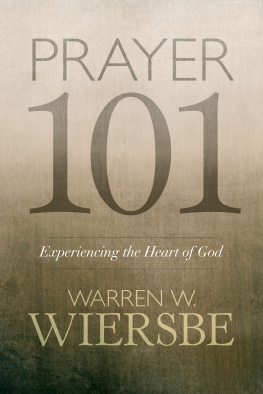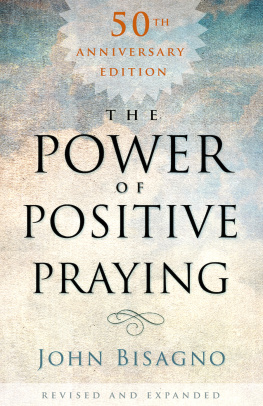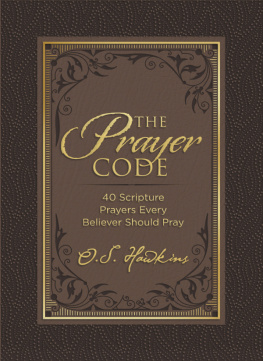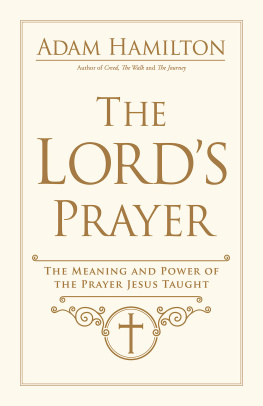The Prayer God Answers
Eberhard Arnold & Richard J. Foster

Published by Plough Publishing House
Walden, New York
Robertsbridge, England
Elsmore, Australia
www.plough.com
Copyright 2016 by Plough Publishing House
All Rights Reserved.
PRINT ISBN: 978-0-87486-700-8
EPUB ISBN: 978-0-87486-701-5
MOBI ISBN: 978-0-87486-702-2
PDF ISBN: 978-0-87486-703-9
Eberhard Arnolds essay was first published in German in 1913 as Die bermacht des Gebetslebens in Lebensbeweise lebendiger Gemeinden and revised by the author in 1929. Translated into English by Eileen Robertshaw, Winifred Hildel, and Miriam Mathis; revised and modernized by Charles E. Moore.
Richard J. Foster essay copyright 2016 by The Richard J. Foster LLC.
Cover image: Vasilij Ivanovic Surikov, detail, Young Woman at Prayer, 1879 (oil on canvas), / Private Collection / Photo Bonhams, London, UK / Bridgeman Images
Let anyone who is thirsty come to me and drink.
Whoever believes in me, as Scripture has said, rivers of
living water will flow from within them.
John 7:3738
Why Pray?
GOD IS LIFE, rich and overflowing life. He is love, and he wants to draw all of us into his life and into his love. Time and again he seeks to lift us into the realm where his life rules.
This is why God stepped out of himself to come to us in his Son. In Jesus, God has opened his heart to us. He has turned his face to us. He comes to us, reveals his thoughts, and shows us who he is and what he wills. He gives us everything we need, and wants to perfect the work he has begun in us. Amazingly, we feeble and insignificant beings are the object of his concern. Out of the incomprehensible love of his heart, God loves each of us quite personally. In his concern for humankind, God seeks out all people and invites them to take part in his new creation.
God wants each of us to respond to him personally and practically. He wants us to know his heart, accept his work, affirm his will, and carry it out. But most of all, God wants to give himself to us. He gives us his spirit so that we might live, act, and work just as his Word did when it became flesh.
God wants us to worship him in the spirit of devotion that grasps the essential and puts it into practice (Matt. 4:10). Since Jesus came to us, we can approach the Father in spirit and in truth (John 4:2324). The spirit of truth frees us from religious superficiality, idolatry, and impure motives, and brings us under Gods rulership. This truth is the clear, authentic Word of God, which has come from God since the beginning of time.
We cannot come to the Father in spirit or in truth if we expend all our strength trying to secure our own salvation, or just keeping our spiritual life above water. People who are so preoccupied with themselves have no strength left to love. But once they are saved from the living death of a separate and selfish life, they will share in the rejuvenating unity and freedom that God promises everyone who is ready to receive Jesus (John 5:24). When they find this freedom, they will devote all they are and have to the One who freed them, giving themselves in love to all people (1 John 3:14). This all-embracing love for others is the mark of those who have an ardent, personal love for Jesus.
THIS PERSONAL LOVE for Jesus finds natural expression in heartfelt prayer. Of course, it is really God whom we love in Christ. If we believe in God as he is, as he lives and works, we shall feel compelled to communicate with him again and again. Those who have faith are filled with unending joy that God can be found now, today.
Through the life, ministry, and death of Jesus, we experience how great and holy Gods love is. Because of this we are always conscious of what separates us and cuts us off from the unity which alone can sustain life. We come before God in prayer to confess the separating sin of our own nature, and to thank God for forgiving our sin (Ps. 32:36). Christs victory over sin, evil, and the demonic powers of self unites us with God and with his church.
When we experience the death of Christ, our hearts are made pure. Through community in the church, we are released from the guilt of our egoistic lives. Now we can approach God in complete confidence, our hearts intent on him and his kingdom. We know that the baptism of faith has cleansed us of deadly lust. Bound with others, we live in the certainty of eternal life; we know we can trust in Gods faithfulness to his promises (Heb. 10:2223). And so our hearts overflow with indescribable thankfulness. We cannot help but pray to the One who has delivered us from the blinding darkness, from the sinister spell of Satans tyranny, and from the bodys death and disintegration (Col. 1:1214).
With great joy we come before God in faith to praise and thank him. We recognize in such experiences that the whole nature and character of God is goodness, kindness, mercy, abundant life, and strengthening love. Our joy in the heart of God moves us to break out in thanksgiving, and our voices ring out, glorifying God in word and song. Instead of plunging us into the wildness and frivolity of selfish enjoyment, our joy leads us to honor God day and night, glorifying him and him alone.
We pray to thank God for all that he is, in the name of Jesus Christ, who revealed him to us. How indescribably great is the love of God, that he is willing to hear, and even desires, this stammering of us feeble human beings! With his light upon us, our joy in thanking him is anchored deeply in what is profoundly serious. We cannot help but honor the untouchable holiness of God and his justice.
Our gratitude can know no bounds. If we really want to honor God, we will also thank him with all our hearts when his just and holy judgment has to humble us and make us small. We will never stand before God demanding, seeking to be justified, or in self-confidence. When we recognize how weak we are and that God loves us and accepts us in our smallness, the humility of gratitude and worship gives us the courage to speak to God. In fact, we can only pray when we are so keenly aware of our own limitations that it is clear to us that we can do nothing without the power of Gods love. We pray to confess our inadequacy, to admit that Gods kingdom is not here, but that we need it and want it to come. We approach God with empty hands. We raise them up and open them to him, and kneel before him to express our smallness and emptiness.
Only through faith in God can his will be fulfilled in our lives. With everything we do, we thank God for giving us a faith that leads to action. Our gratitude is born of our recognition that we are unworthy of Gods care and his generous gifts. It is only through grace that we can do the works of God. Our faith in his unmerited generosity fills us with love, with its insistence on action. When this happens, we come to know what an inexhaustible wealth of grace awaits all those who call on the Lord for power and new life (Ps. 86:5; Rom. 10:12). We know that this is a power we can never attain on our own. This drives us to pray.
GOD DOES NOT WANT, for his own sake, to be asked that his name be holy, his will good, or his rulership complete. But for our sake he wants us to pray to him for these things, so that instead of profaning his name, resisting his will, and arrogantly asserting ourselves in rebellion against his rule, we might truly revere him, do his will, and accept his rule. He wants us to acknowledge this. He wants us to pray, humbly admitting that our own sinfulness, stubbornness, and halfheartedness are obstacles that only he can overcome.















